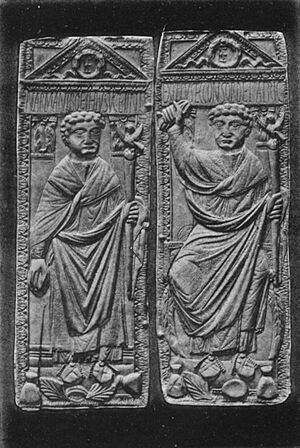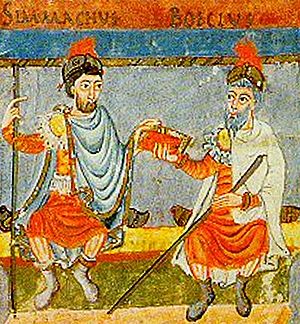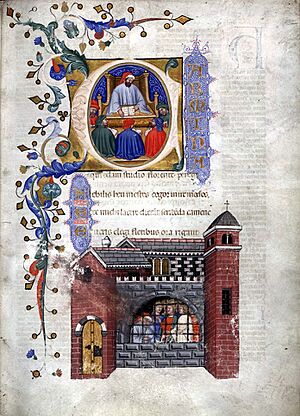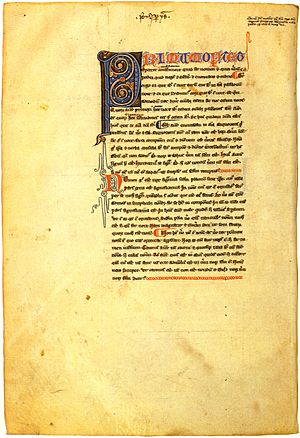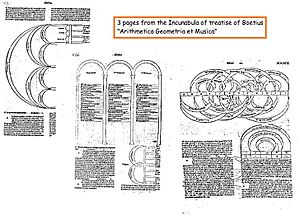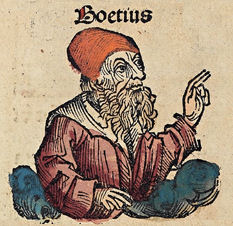Boethius facts for kids
Quick facts for kids SaintBoethius |
|
|---|---|
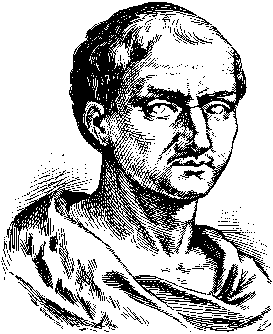 |
|
| Martyr | |
| Born | c. 480 Rome, Kingdom of Odoacer |
| Died | 524 (aged 44) Pavia, Ostrogothic Kingdom |
| Venerated in | Diocese of Pavia |
| Major shrine | San Pietro in Ciel d'Oro |
| Feast | 23 October |
Anicius Manlius Severinus Boethius, often called Boethius (born around 480 AD, died 524 AD), was an important Roman figure. He was a senator, a consul, and a philosopher during the Early Middle Ages. Boethius was key in translating many Greek classics into Latin. This helped keep ancient knowledge alive for Western scholars. He is also seen as a Christian scholar, along with Cassiodorus. The Diocese of Pavia officially recognized him as a saint in 1883. His feast day is October 23.
Boethius was born in Rome shortly after the Western Roman Empire fell. He came from the important Anicii family. After his parents died, Quintus Aurelius Memmius Symmachus raised him. Boethius learned both Latin and Greek very well. He became a powerful statesman in the Ostrogothic Kingdom. He was a senator by age 25 and a consul by age 33. Later, he became a personal advisor to Theodoric the Great.
Boethius wanted to connect the ideas of Plato and Aristotle with Christian theology. He planned to translate all Greek classics into Latin. He wrote many translations and comments on works by Nicomachus, Porphyry, and Cicero. He also wrote a lot about music, mathematics, and theology. Even though he died before finishing his translations, they were very important. Thanks to him, many of Aristotle's works survived until the Renaissance.
Despite his success, Boethius became unpopular in the Ostrogothic court. He spoke out against the widespread corruption in the government. After defending another consul, Caecina Decius Faustus Albinus, from false charges, Boethius was imprisoned by Theodoric around 523. While in prison, he wrote The Consolation of Philosophy. This book is about luck, death, and other big questions. It became one of the most famous books of the Early Middle Ages. He was executed in 524 and is traditionally seen as a martyr in the Christian faith.
Contents
Early Life and Education
Boethius was born in Rome around 480 AD. His exact birth date is not known. He came from the Anicii, a very rich and powerful family. This family included emperors and many consuls. However, before Boethius was born, his family had lost some of its power.
Boethius' grandfather, also named Boethius, died in 454. His father, Manlius Boethius, who was a consul in 487, died when Boethius was still young. So, Quintus Aurelius Memmius Symmachus, another important Roman, adopted him. Symmachus taught him about philosophy and literature. Later, Boethius married Symmachus' daughter, Rusticiana. They had two sons, Symmachus and Boethius.
Because he was adopted into the wealthy Symmachi family, Boethius had excellent teachers. He became very good at Greek, which was rare in the Western Roman Empire. He spent his early career translating all the works of Plato and Aristotle. Some of his translations are the only copies of these Greek texts that survived into the Middle Ages. Boethius' strong Greek skills led some scholars to believe he studied in the East.
Boethius' ability in Greek was very helpful throughout his life. It allowed him to translate many classic Greek works. His interests were wide, including music, mathematics, and theology.
Rise to Power
Boethius was inspired by Plato's book Republic. He decided to leave his studies and work for Theodoric the Great. They first met in 500 AD when Theodoric visited Rome. We don't know much about their early relationship. But it's clear Theodoric liked Boethius.
In the next few years, Boethius quickly rose in government. He became a senator by age 25 and a consul by 510 AD. His first known tasks for Theodoric included checking on claims of coin tampering. He also made a waterclock for Theodoric to give to King Gundobad of the Burgundians. He even found a lyre-player for Clovis I, King of the Franks.
In his book Consolation, Boethius wrote about his greatest achievement. This was when both his sons were chosen by Theodoric to be consuls in 522. This was a huge honor. It showed Theodoric's favor for Boethius. Also, the Byzantine emperor Justin I supported this choice. In the same year, Boethius became magister officiorum. This meant he was in charge of all government and palace affairs. He wrote that he sat "between the two consuls as if it were a military triumph."
Boethius faced problems within a year of this high position. He tried to fix the widespread corruption in the Roman Court. He worked to stop plots by royal officials. He also confronted a minister who was taking from the poor. He used the king's power to stop a food shipment that would have made a famine worse. These actions made Boethius unpopular with other court officials. However, he remained in Theodoric's favor for a time.
Downfall and Death
Around 520 AD, Boethius tried to improve relations between the Roman See (Rome) and the Constantinopolitan See (Constantinople). At this time, both were part of the same Church. However, disagreements were starting to appear between them. This might have led to him losing royal favor. Centuries later, these disagreements led to the East–West Schism in 1054.
In 523, Boethius lost his power. He was imprisoned in Pavia for what was called treason. He was executed in 524. Historical records generally agree on what happened. At a meeting, an official named Cyprianus accused former consul Caecina Decius Faustus Albinus of treason. Boethius defended Albinus. He said the charge was false. He even claimed that if Albinus was guilty, then he and the whole senate were too.
Cyprianus then accused Boethius of the same crime. Three men claimed they saw the crime. Boethius was arrested and exiled to a country estate. There, he was put to death. Soon after, Theodoric also had Boethius' father-in-law, Symmachus, killed. Their property was taken away. Boethius claimed his crime was trying to protect the Senate.
Theodoric felt threatened by events happening in other countries. The disagreements between the churches had been resolved. The Christian nobles in his kingdom wanted to reconnect with Constantinople. Also, the new king of the Vandals had killed Theodoric's sister. Christians who followed the Arian faith were being treated badly in the East.
After Boethius' execution, his body was buried in the church of San Pietro in Ciel d'Oro in Pavia. This is also where Augustine of Hippo is buried. Boethius' wealth was taken, and his wife, Rusticiana, became poor.
Some historians wondered if Boethius was truly Christian because his famous book, Consolation, does not mention Jesus. However, most scholars today believe he was a strong Christian. He lived in a time when both classical and Christian cultures were valued.
Major Works
The Consolation of Philosophy
Boethius' most famous work is The Consolation of Philosophy (De consolatione philosophiae). He wrote it while waiting for his execution in prison. The book is an imaginary conversation between Boethius and Philosophy, who appears as a wise woman. She argues that even though the world seems unfair, there is a higher power. Everything else is less important than this divine plan.
Many copies of this book survived. It was widely read, translated, and printed across Europe. Besides this work, Boethius' main goal was to save ancient classical knowledge, especially philosophy. He wanted to translate all the works of Aristotle and Plato from Greek into Latin.
On Topical Differences
His finished translations of Aristotle's works on logic were the only major parts of Aristotle's writings available in Latin Europe for centuries. This was until Aristotle's works were rediscovered in the 12th century. Boethius also wrote two books on how to argue, called In Ciceronis Topica and De topicis differentiis. These books helped people understand how to build strong arguments.
Boethius' ideas on argument were very important. They influenced thinkers throughout the Middle Ages and into the early Renaissance. He introduced the idea of "maximal propositions." These are basic truths that are known without needing proof. They are like the foundation for all arguments. He also talked about "differentiae," which are ways to categorize these truths.
These ideas were important for both rhetoric (persuasive speaking) and dialectic (logical discussion). Boethius' work helped shape how people thought about logic and argument for hundreds of years.
On Arithmetic
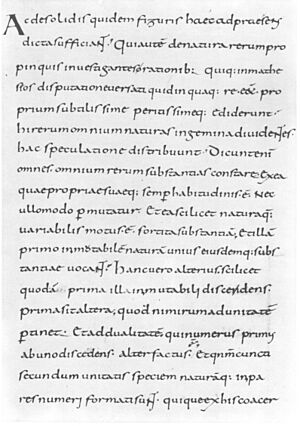
Boethius wanted to pass on the great Greek and Roman culture. He wrote textbooks on music, astronomy, geometry, and arithmetic. Many of his writings were very influential in the Middle Ages. They were based on the ideas of philosophers like Porphyry.
Boethius wrote a commentary on Porphyry's Isagoge. This book brought up the "problem of universals." This is a big question in philosophy: Do general ideas (like "beauty" or "justice") exist on their own, or only in our minds? This was a major debate in medieval philosophy.
His translation of Nicomachus' book on arithmetic (De institutione arithmetica libri duo) and his music textbook (De institutione musica libri quinque) were important. They helped medieval education. De arithmetica starts with basic number ideas. His translations of Euclid on geometry and Ptolemy on astronomy are no longer around, if he finished them. Boethius also translated Aristotle's De interpretatione and Categories with his own comments. Historians say Boethius is why Aristotle's works were popular in the Middle Ages.
On Music
Boethius' De institutione musica was one of the first music books printed in Venice. It was written in the early 500s. It helped medieval music thinkers understand ancient Greek music. Boethius believed that arithmetic and music were connected. He thought they helped explain the order and harmony of the universe.
In De Musica, Boethius described three types of music:
- Musica mundana – the music of the spheres or world. This "music" was not heard but understood as the harmony of the universe.
- Musica humana – the harmony of the human body and spirit.
- Musica instrumentalis – instrumental music.
Boethius said that "music is so naturally united with us that we cannot be free from it even if we so desired." During the Middle Ages, Boethius' texts were used to teach the liberal arts. He wrote many books explaining rhetoric, grammar, and logic. These were commonly used to study the three basic arts. Historian R. W. Southern called Boethius "the schoolmaster of medieval Europe."
Sacred Works
Boethius also wrote Christian theological books. These supported Catholicism and spoke against Arianism and other different forms of Christianity.
He wrote five known theological works:
- De Trinitate – "The Trinity," where he defended the idea that God is three persons with the same nature. He argued against the Arian view, which was the faith of the king of Italy.
- Utrum Pater et filius et Spiritus Sanctus de divinitate substantialiter praedicentur – "Whether Father, Son and Holy Spirit are Substantially Predicated of the Divinity," a short work using reason to support Catholic views of God.
- Quomodo substantiae, Boethius' idea that all things are good.
- De fide catholica – "On the Catholic Faith."
- Contra Eutychen et Nestorium – "Against Eutyches and Nestorius," written around 513. In this, he argued for a middle ground that matched Roman Catholic faith.
His theological works were very important in medieval philosophical thought. They influenced ideas about logic and reality.
Legacy
Historian Edward Kennard Rand called Boethius "the last of the Roman philosophers and the first of the scholastic theologians." Even though his math books were used in early universities, his last work, The Consolation of Philosophy, made him famous. This book is a conversation between Boethius, who is sad and angry in prison, and the spirit of philosophy. Philosophy is shown as a wise and kind woman. The book, written in both prose and poetry, teaches how to accept difficulties. It encourages a calm approach to bad luck.
Parts of the book are like Plato's dialogues. The spirit of philosophy questions Boethius and challenges his feelings about hardship. The book was translated into Old English by King Alfred. Later, Chaucer and Queen Elizabeth translated it into English. Many copies survived, and it was widely read and printed across Europe.
"The Boethian Wheel" is a famous idea from his Consolation. It's a metaphor for how history and life change. As the wheel turns, people with power and wealth can lose everything. People who are poor can rise to greatness. This idea was very popular in the Middle Ages. It was shown in many artworks. You can find descriptions of "The Boethian Wheel" in medieval literature.
Veneration
People in the centuries after Boethius' death saw him as a Christian martyr. Today, he is recognized as a saint and martyr in the Catholic faith. He is included in the Roman Martyrology. His cult is celebrated in Pavia, Italy. His status as a saint was confirmed in 1883. His feast day is October 23. Pope Benedict XVI explained that Boethius' teachings help modern Christians understand God's plan. He is also honored in the Eastern Orthodox Church.
Images for kids
-
Boethius' De arithmetica in a manuscript written for Charles the Bald
See Also
 In Spanish: Boecio para niños
In Spanish: Boecio para niños
- De Fide Catolica
- The Consolations of Philosophy (by Alain de Botton)
- The Consolation of Philosophy (by Boethius)
- Prison literature
 | Madam C. J. Walker |
 | Janet Emerson Bashen |
 | Annie Turnbo Malone |
 | Maggie L. Walker |


